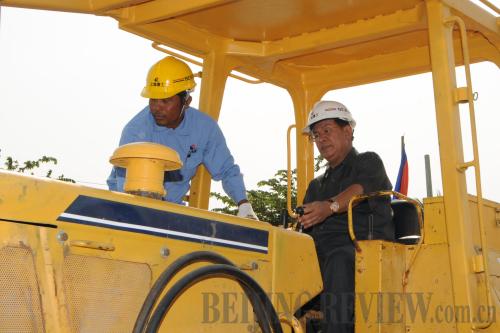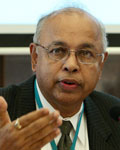|
 |
|
AID FOR DEVELOPMENT: Cambodian Prime Minister Hun Sen (right) drives a bulldozer at the groundbreaking ceremony of a road expansion project funded with a soft loan from China on the outskirts of Phnom Penh on February 14 (LEI BAISONG) |

The Asia-Pacific region now faces another year of slowing growth, but the region will remain the anchor of global economic stability, said a UN Economic and Social Commission for Asia and the Pacific (ESCAP) survey released in May. In a recent interview with Beijing Review, Amitava Mukherjee, a senior expert of ESCAP's Macro Economic Policy Development Division, shared his views on regional economic and social development. Excerpts follow:
Beijing Review: The ESCAP report says the V-shaped recovery in 2010 was short-lived as the world economy entered a second stage of the financial crisis in 2011. What are the future trends?
Amitava Mukherjee: The deceleration is not as sharp as it was in 2008 and 2009. The recovery has also not been as sharp as we have seen. There will be a gradual recovery. If we look at 2007-08, it was a sharp downturn. Then from 2009, there was a sharp upturn. In 2010, it came down slowly and it is also growing up slowly. Instead of a V-shape, it is more like a U-shape.
Despite challenges and uncertainties, ESCAP still considers the Asia-Pacific region as the anchor of stability and growth for the world economy. Why?
Look at the global stage—Europe is in crisis and the American economy is stagnating. They were the two major drivers which generated the growth of the world economy. Then compare that with the Asian economies. The two major economies of Asia, China and India, are growing fastest. And these two have potential to grow. They have hit the bottom, so now China and India will rise. In spite of what difficulties they had, they are going to significantly increase.
According to the recently released ESCAP survey, China is supposed to grow 8.6 percent; India is supposed to grow 7.5 percent; Indonesia will grow 6.5 percent; Viet Nam will grow 5.8 percent; and Uzbekistan will grow 8 percent. All the countries have positive growth rates. When Europe is in trouble and is not growing and the United States is not growing, the recovery can only come from these countries, driven by the Chinese growth and the Indian growth.
Against the backdrop of the lingering global economic downturn, how will the UN promote anti-poverty efforts in developing countries in the Asia-Pacific?
The UN has different ways of promoting anti-poverty efforts. For instance, ESCAP operates through analytical studies and provides technical advice. Then we have UN agencies which have direct projects in developing countries.
The UN has a major role in Myanmar where we are trying to help the country overcome poverty. We have a significant project in North Korea. Very few agencies have direct intervention there. We create models which countries and governments can adopt or follow. The UN and ESCAP have established a system that helps countries to form policies and develop institutions that are anti-poverty.
The UN has played a significant role in restoring democracy in Myanmar. In a democratic country, there is political incentive to reduce poverty because the leaders have to go back to the people for votes. Reducing poverty is not only good economics but also good politics. So, these are ways through policies, structures and institutions that ESCAP tries to promote anti-poverty programs despite the fact that growth is going down.
I should also mention economic growth is going down but it is not negative. There is a cake to distribute. Maybe the cake is not growing as fast, but the cake is still there. Because of this growth, countries are able to provide efficient development assistance. For instance, China provides a lot of assistance to Myanmar, Laos, Cambodia and Mongolia. India provides a lot of assistance to Nepal and Bhutan.
| 